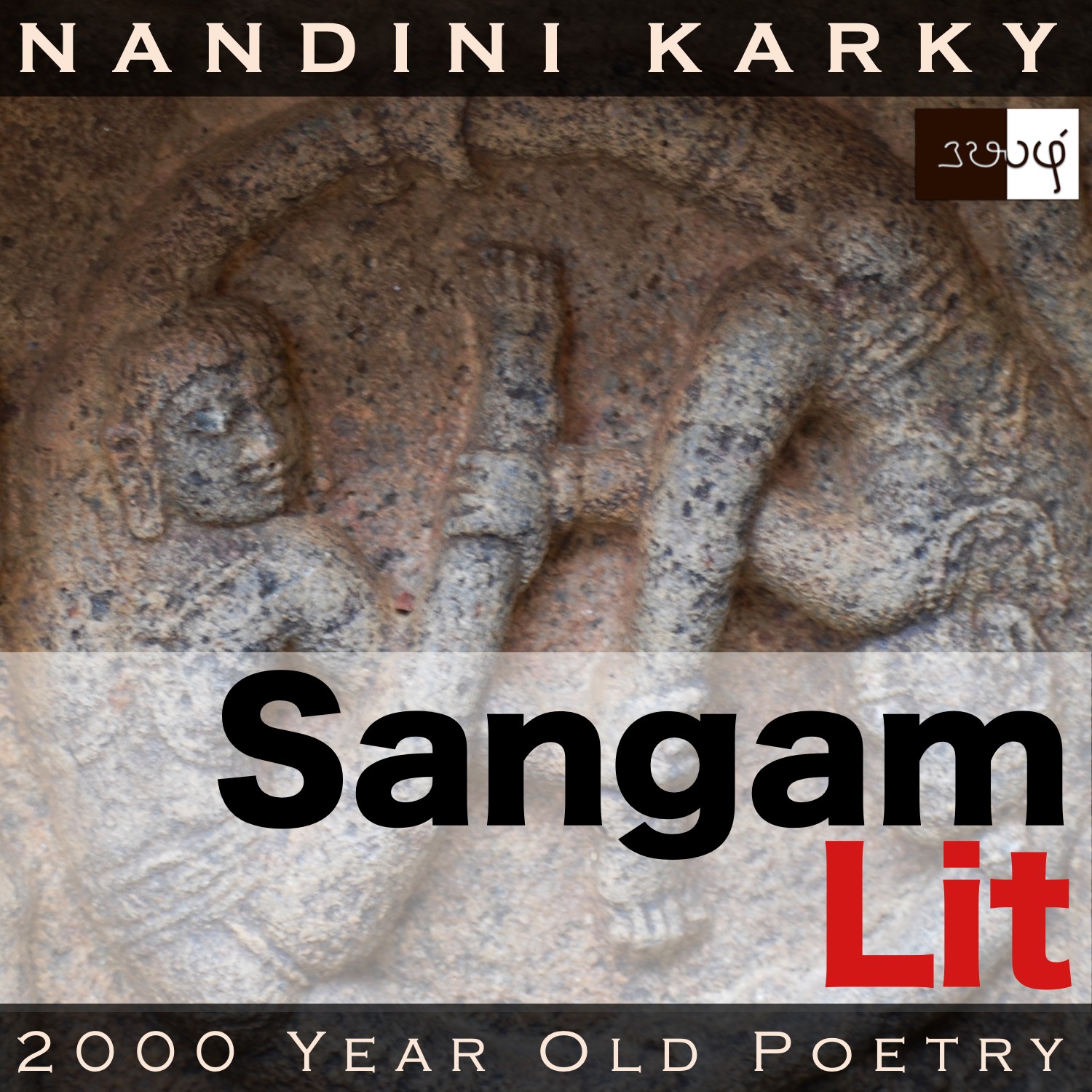Podcast: Play in new window | Download
Subscribe: Apple Podcasts | Spotify | Amazon Music | Android | iHeartRadio | TuneIn | RSS | More

In this episode, we become acquainted with the social customs depicted in Sangam Literary work, Natrinai 50, written by ‘Marutham paadiya Ilangkandungko’. The poem is set in the ‘Marutham’ landscape or the agricultural lands and dwells on the theme of ‘love-quarrel’ between the man and his lady. It speaks in the voice of the lady’s confidante to the singer-messenger, refusing him entry to the lady’s house, as the man listens nearby.
அறியாமையின், அன்னை! அஞ்சி,
குழையன் கோதையன் குறும் பைந் தொடியன்
விழவு அயர் துணங்கை தழூஉகம் செல்ல,
நெடு நிமிர் தெருவில் கைபுகு கொடு மிடை
நொதுமலாளன் கதுமெனத் தாக்கலின்,
‘கேட்போர் உளர்கொல், இல்லைகொல்? போற்று’ என,
‘யாணது பசலை’ என்றனன்; அதன் எதிர்,
‘நாண் இலை, எலுவ!’ என்று வந்திசினே-
செறுநரும் விழையும் செம்மலோன் என,
நறு நுதல் அரிவை! போற்றேன்,
சிறுமை பெருமையின் காணாது துணிந்தே.
The poem has an inherent rhythm, as announced by the alliterative first line, ‘அறியாமையின், அன்னை! அஞ்சி’, which is the ‘Monai’ rhythmic pattern in Tamil. Shortly following is another pattern in the line ‘குழையன் கோதையன் தொடியன்‘ called ‘Iyaipu’, in which the last letters rhyme. Not leaving behind ‘Ethugai’, that unique rhythmic pattern of second letters concurring, we have ‘நொதுமலாளன் கதுமென’ resounding in our ears. As the neat choreography of words hints to us, this poem is indeed about an ancient dance form called ‘thunangai’, wherein women would dance together in a circle bending elbows and touching their shoulders. While there is dance on one side, with its quick questions and exchanges, there’s an intense dialogue-driven drama unfolding, as well. Time to watch the show now!
The scene opens with a singer, sent as a messenger by the man, requesting entry to the lady’s house, while the man is seen waiting nearby. The lady’s confidante refuses entry to the singer-messenger and she explains the reasons to the lady as thus, “My friend, fearing for you, hearing that your man was arriving laden with earrings, garlands and bracelets, I went to see for myself, the thunangai dance, arranged as part of the village festival. As it has been custom for town leaders to start the festivities by granting these gifts to the dancers, your man was showering them with those gifts. Just then, this singer, who was not part of the festivities, came too close to me and started pulling me into the dance. Shocked, I shouted, ‘Is there no one to question this atrocity?’ Not regarding my discomfort, he said, ‘Your tender nature is beauteous!’ To which, I replied ’You are without shame!’ , and left the place in a huff. My dear friend with a fragrant forehead, I completely forgot that your man is someone who is loved even by his foes and transferred my anger on the singer to your man. It’s all to be attributed to my ignorance of not discerning smallness and greatness!’ With these words, though the lady’s confidante refuses entry to the messenger, she calms the mind of the lady with regard to her man’s conduct and thus gives hope to the waiting man to approach his lady.
Watching a performance is one thing. Understanding is something else entirely. I struggled a lot with this poem for each explanation and translation seemed to move in completely different directions. But then, soaking in the words, the meaning slowly revealed itself. Let’s go back to the first question: Why is the man hesitating and not entering his own house? As was the practice of then, the man had gone seeking the company of courtesans and this set-up the stage for the love-quarrel between the man and his wife. So, instead of directly approaching the lady, perhaps for fear of being shot-down in anger, he sends the singer as his messenger. Some sources say that the ‘Thunangai’ dance was a dance of courtesans and not something married women would indulge in. So, hearing that the man was heading to this dance, the lady’s confidante goes to investigate. She fears for the love-life of the lady. Going there, she finds the man endowing the dancers with gifts of garlands and jewellery. But, she also mentions in hindsight that it is something that a town’s leader is given to do. Through this, she tries to present the man in a blameless light. To calm the anger of the lady towards the man, she takes on the ploy of transferring the blame to the singer and tells a story of his uncouth behaviour during the festivities. As a finishing touch, she praises the man to the skies saying even his enemies love him and takes the blame on herself for not perceiving his greatness in the heat of the moment.
The lady’s confidante aims to remove the anger in the lady’s mind and make her accept the man. But, anger does not dissipate in a moment’s notice and so she helps the lady to displace her anger on the man’s companion, the singer. Finding an outlet for the negative feelings in the lady, she then paints a picture of positivity about the man. Thus, with her smart manoeuvring, the lady’s confidante solves the love-quarrel between the man and the lady and brings them together. Here, in a few lines of poetry, unfolds a riveting drama of conflict and resolution!




Share your thoughts...